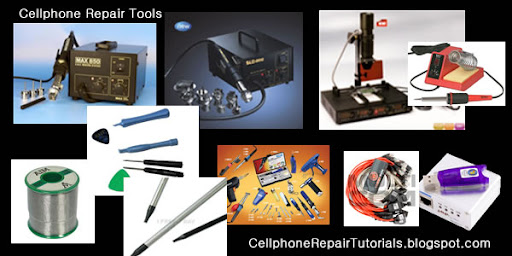Preparing the Proper Tools For Repairing..
There are many different variety and Cellphone Repair Tools. A lot companies offers online purchasing for such certain tools for beginning into business... You can choose which is which for such certain product.
In my opinion, when you are into a planning to purchased any tools, Ask some experts first for that certain products you are going to buy...

1. Multi-Tester ( Analog/Digital)- Used to measure Voltages, Currents and Resistance in electronic components.
2. Screwdrivers - Used to loosen the phones screws.
3. Tweezers - used to hold and pick small cellphone component parts.
4. Soldering iron - used to solder / resolder electronic parts.
5. Soldering lead - used to bonds Electronic components.
6. Soldering Flux and Paste - Used to tightened soldering quality.
7. BGA Rework station - Applied Heat to remove and replaced parts and IC chips.
8. Re balling Kits - Tools for re balling IC bumps, this composed of Stencil plates, Ball Leads and Spatula
9. DC Regulated Power Supply- Used to substitute battery voltage when working on hardaware troubleshooting.
10. Flashing and Unlocking Device- it is Software Tools that used to unlock and flash mobile phones
programmable circuits.
11. Cables and Wires - Used as an Interface from PC to cellphones when working on like flashing, unlocking
and jailbreaking.
Test Equipment
Electronic test equipment is specialized equipment which is used in the testing of electronics. It can be utilized in the construction of prototypes and new products, and in maintenance and troubleshooting. A huge family of components are included under the umbrella of electronic test equipment, ranging from simple equipment which is used for routine home repair to sophisticated systems which are used exclusively by engineers. Many companies sell used electronic test equipment, which is often far less costly than brand new products and just as useful.
All of the devices in the family of electronic test equipment are capable of providing some sort of information about an electronic device or circuit. This information can vary from something simple, like whether or not current is flowing through a circuit, to something complex, like whether or not the components of a motherboard are working properly. Electronic test equipment may be passive, or it may emit an active signal and register a response, and it can provide specific measurements, or more generic data.
Typically, electronic test equipment includes a way to interface with an item being tested, such as a probe or clip, and a readout which provides information, ranging from a light which becomes illuminated when something is working properly to a readout with measurements. Sophisticated equipment may hook up to a computer for the purpose of performing diagnostics, with the equipment running several different tests at once and compiling the information in a computer program. This type of electronic test equipment is often used in the development of new products, to confirm that they are safe and to test their limits.
One of the simplest examples of electronic test equipment is a continuity tester, a device which many people may be familiar with. A continuity tester is used to determine whether a circuit is open or closed. If the circuit is open, it indicates a fault or ground, while if it is closed, it is working correctly. Continuity testers are often used to diagnose home electrical problems, such as a suspected fault in an outlet.
More sophisticated equipment can measure current, resistance, voltage, capacitance, charge, and digital circuits. Testgear, as electronic test equipment is sometimes known, may also combine multiple functions for convenience. Electricians, phone repair men, and cable installers typically carry testgear for use in their work, and electronic test equipment is also used by engineers, physicists, and numerous other researchers and inventors.





0 comments:
Post a Comment